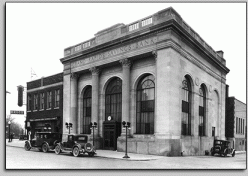GRAND RAPIDS – Does history repeat itself? You can’t help but wonder when a Grand Valley State University History Professor offers a trip back to the Great Depression when many Michigan banks collapsed. In 1933, Michigan played a major role in national bank collapses, starting with the January failure of Detroit's Union Guardian Group.
Dr. Matthew L. Daley will offer a disturbing story woven with greed, arrogance, bad judgment, failed policies and total lack of oversight when he presents “They All Fall Down: Michigan’s Banking Collapse of 1933” at 7 p.m. Thursday, October 8, at the Gerald R. Ford Presidential Museum, 303 Pearl St. NW. Sponsored by the Grand Rapids Historical Society, the program is free to the general public. Parking is also free.
For years following the financial collapse, thousands of Michigan residents found themselves adrift by a system that had consumed community funds, ruined credit, and even put the sacred issue of homeowner up for grabs.
For decades, bank records in most states were sealed, making informed analysis impossible. As a result, to understand what happened, we've had only the macro explanations of neoclassical economists like Milton Friedman,  saying that since business cycles are unpredictable, we should simply let markets self-correct.
saying that since business cycles are unpredictable, we should simply let markets self-correct.
It turns out that the State Archive of Michigan has unsealed bank records no one knew were there -- until recently—that offer a new look at the crisis. These documents summarize the results of accountants who fanned out across the state immediately following the banking crisis to retrieve records, assess the damage and try to recover whatever assets they could.
Professor Daley's presentation is based on this data, allowing him to share hidden details behind the crisis that help answer such questions as: What did boards of directors actually do? Who owns my house now? Dr. Daley creates a micro account of the crisis, an analysis that brings accountability into the story as well as offers a correlation to today’s economic problems.
Please join us for an evening featuring a history lesson that presents many of the same questions we ask ourselves today. Professor Daley teaches Michigan, Great Lakes and urban history and serves as an Historical Society trustee. His research focuses on Detroit and Grand Raids during the early twentieth century.
Photo of the Grand Rapids Savings Bank courtesy of the Grand Rapids Public Library
The Rapidian, a program of the 501(c)3 nonprofit Community Media Center, relies on the community’s support to help cover the cost of training reporters and publishing content.
We need your help.
If each of our readers and content creators who values this community platform help support its creation and maintenance, The Rapidian can continue to educate and facilitate a conversation around issues for years to come.
Please support The Rapidian and make a contribution today.

